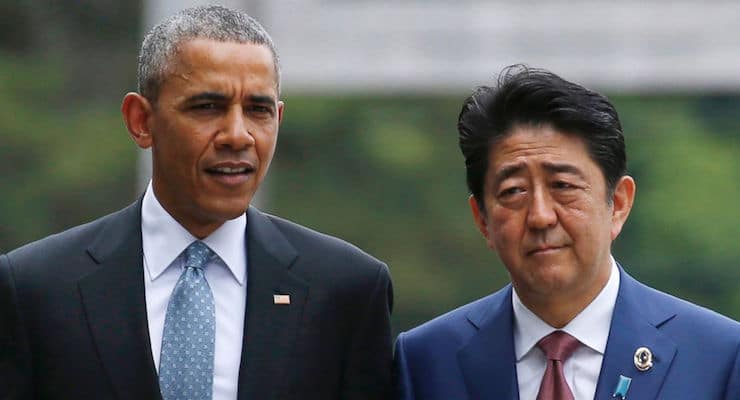

President Barack Obama and Japanese Prime Minister Shinzō Abe visit one of Japan’s holiest sites. (Photo: Toru Hanai/AP)
Japanese Prime Minister Shinzō Abe met this week with President-elect Donald J. Trump to discuss relations between the nations after the election. While most Big Media outlets focused on Mr. Trump’s criticisms of existing trade deals and protections Japan has enjoyed in the post-World War II global order, there is something else the two men very much agree on policy-wise.
Prime Minister Abe and President-elect Trump both warn about the potential and grave dangers of unfettered immigration from Muslim countries plagued by Islamic extremism. The proposed ban and “extreme vetting” outlined by President-elect Trump have been well-reported by the American media, but not too many reports have revealed it is already in effect in Japan.
The official policy of Japan is not to give citizenship to Muslims who come to Japan. In fact, permits for permanent residency are rarely given to Muslims.
According to Dr. Mordechai Kedar, who recently wrote about the policy in The Jewish Press, noted how there are only 10,000 Muslims in the entire nation of roughly 126 million people. Even though others dipute that number, which represents less than one hundredth of one percent, none put it above 100,000.
“The relations with Muslim countries are based on concerns such as oil and gas, which Japan imports from some Muslim countries,” Dr. Kedar wrote.
The fact of the matter is that it is an actual policy in Japan to discourage Muslim immigration and the culture. Their western allies in Europe and the U.S. have preached to the Japanese for years, pressuring them to take refugees in a country where woman who marry Muslim men can become outcasts. But Japanese officials privately boast that there are few if any Islamic terror attacks and the lack of assimilation is not a problem for them.
Juxtaposed to Japan, President-elect Trump’s proposals are meek. Proselytization is prohibited in Japan and there is only one imam in Tokyo, which is a city of over 13 million people.
“Japan is teaching the whole world an interesting lesson: there is a direct correlation between national heritage and permission to immigrate: a people that has a solid and clear national heritage and identity will not allow the unemployed of the world to enter its country; and a people whose cultural heritage and national identity is weak and fragile, has no defense mechanisms to prevent a foreign culture from penetrating into its country and its land,” Dr. Kedar concluded.
In other words, they put the interests of the Japanese people and the culture first. Nationalism, unlike the recent association in the U.S., is not synonymous with xenophobia or bigotry in Japan. Immigration is simply the same as any other government policy; it is designed to be sensitive to the interests and the needs of the domestic population.






